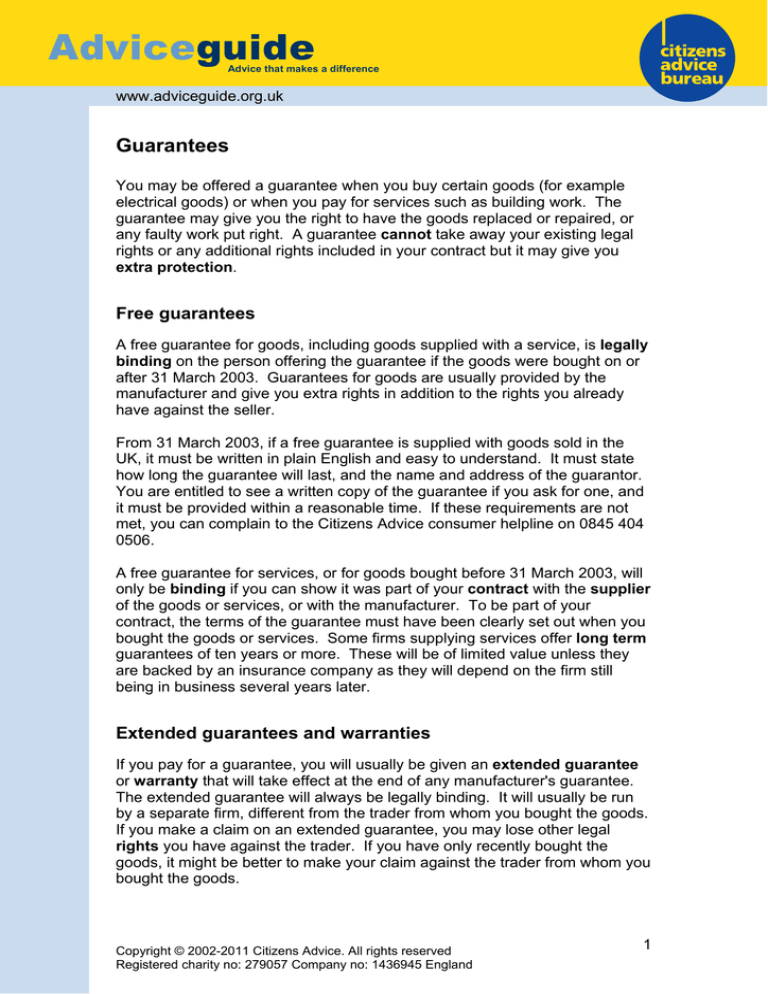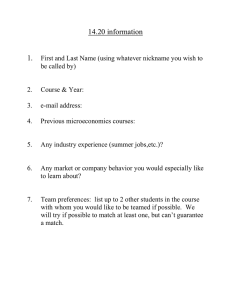
Adviceguide
Advice that makes a difference
www.adviceguide.org.uk
Guarantees
You may be offered a guarantee when you buy certain goods (for example
electrical goods) or when you pay for services such as building work. The
guarantee may give you the right to have the goods replaced or repaired, or
any faulty work put right. A guarantee cannot take away your existing legal
rights or any additional rights included in your contract but it may give you
extra protection.
Free guarantees
A free guarantee for goods, including goods supplied with a service, is legally
binding on the person offering the guarantee if the goods were bought on or
after 31 March 2003. Guarantees for goods are usually provided by the
manufacturer and give you extra rights in addition to the rights you already
have against the seller.
From 31 March 2003, if a free guarantee is supplied with goods sold in the
UK, it must be written in plain English and easy to understand. It must state
how long the guarantee will last, and the name and address of the guarantor.
You are entitled to see a written copy of the guarantee if you ask for one, and
it must be provided within a reasonable time. If these requirements are not
met, you can complain to the Citizens Advice consumer helpline on 0845 404
0506.
A free guarantee for services, or for goods bought before 31 March 2003, will
only be binding if you can show it was part of your contract with the supplier
of the goods or services, or with the manufacturer. To be part of your
contract, the terms of the guarantee must have been clearly set out when you
bought the goods or services. Some firms supplying services offer long term
guarantees of ten years or more. These will be of limited value unless they
are backed by an insurance company as they will depend on the firm still
being in business several years later.
Extended guarantees and warranties
If you pay for a guarantee, you will usually be given an extended guarantee
or warranty that will take effect at the end of any manufacturer's guarantee.
The extended guarantee will always be legally binding. It will usually be run
by a separate firm, different from the trader from whom you bought the goods.
If you make a claim on an extended guarantee, you may lose other legal
rights you have against the trader. If you have only recently bought the
goods, it might be better to make your claim against the trader from whom you
bought the goods.
Copyright © 2002-2011 Citizens Advice. All rights reserved
Registered charity no: 279057 Company no: 1436945 England
1
Adviceguide
Advice that makes a difference
www.adviceguide.org.uk
Before agreeing to buy an extended guarantee, you will need to look at:
what is covered by the guarantee. Some extended guarantees will
only cover mechanical break down and not wear and tear. Some will
require you to pay labour charges. Check what is covered before you
decide to buy it; and
whether the extended guarantee is underwritten by an insurance
company. If the supplier goes out of business, you should still be able
to claim from the underwriters for any work that needs doing under the
guarantee; and
when the extended warranty starts. You may find that your existing
rights are sufficient anyway. If you have problems shortly after
purchase, you should complain to the trader rather than the guarantee
company (otherwise you may lose your rights against the trader
If the goods or service are likely to have a considerable amount of use,
it may be worth considering an extended guarantee if this will cover you
for wear and tear or accidental damage; and
whether you are already covered by your home contents insurance;
and
whether it would be cheaper to take out a separate insurance policy
to cover several items.
Be sure to read the term and conditions before buying an extended
guarantee and ask the seller to explain anything you are unsure about.
Extended warranties for electrical goods
You have additional rights when you buy an extended warranty (sometimes
called a service agreement) to cover domestic electrical goods. Traders must:
display the price of the warranty alongside the goods
give you a written quotation, on request, for the price of a warranty.
They are legally obliged to honour this price if you go back within 30
days to buy the warranty after you have bought the goods
inform you of your rights to buy a warranty elsewhere and that the
electrical item you bought may already be covered by your own
household contents insurance.
You also have the right to cancel the warranty within 45 days and get a full
refund if you have not made a claim. If you make a claim on the warranty, you
can still cancel and get a pro-rata refund at any time up until the end of the
service agreement.
Copyright © 2002-2011 Citizens Advice. All rights reserved
Registered charity no: 279057 Company no: 1436945 England
2
Adviceguide
Advice that makes a difference
www.adviceguide.org.uk
Is it worth claiming
Although you may have existing rights, you may want to claim under the
guarantee if:
the trader is unlikely to give you what you want and it will be easier to
get a repair or replacement under the guarantee
it is inconvenient to return the goods to a shop and easier to return
them by post to a manufacturer or distributor
the supplier has gone out of business
the goods were bought abroad and the manufacturer has a branch in
the United Kingdom
you are offered a better deal under the guarantee
the goods were received as a present or a prize and the manufacturer
or seller will not help you.
Making a claim
If you wish to make a claim under a guarantee or warranty, you will first need
to check that:
it covers your problem. You will need to be able to prove this
it is valid and you are within the time limit.
You may have to pay for any repair work yourself and then claim the money
back from the company who issued the guarantee. You should check the
procedure in the guarantee before doing anything.
Remember you may still have rights against the supplier (see above).
If you decide to use the guarantee, you will need to:
make contact as soon as you discover the fault. Write to the company
that issued the guarantee and enclose a copy of it. You will need to
give details of where and when you bought the goods or services,
describe the problem and when it first appeared and the action that you
want taken under the guarantee (this will usually be a replacement or
a repair). Don't demand something that isn't covered by your
guarantee
if the company which issued the guarantee has gone out of business,
write to the insurance company that underwrote the guarantee
write to the supplier of the goods or services, explaining that they are
not satisfactory and that you are making a claim under the guarantee.
You should make it clear that the supplier is still responsible for the
faulty goods or services and that, if the problem is not resolved after
using the guarantee, you will make a claim for repair, replacement or
compensation against her/him
write to the credit company, if you bought the goods or services on
credit as it may have equal liability).
Copyright © 2002-2011 Citizens Advice. All rights reserved
Registered charity no: 279057 Company no: 1436945 England
3
Adviceguide
Advice that makes a difference
www.adviceguide.org.uk
Other fact sheets that might be helpful
Supplier goes out of business
Goods
Credit
Services
This fact sheet is produced by Citizens Advice, an operating name of
The National Association of Citizens Advice Bureaux. It is intended to
provide general information only and should not be taken as a full
statement of the law on the subject. Please also note that the
information only applies to England and Wales.
This fact sheet was last updated on 5 August 2012, and is reviewed
regularly. If it is some time since you obtained this fact sheet, please
contact your local Citizens Advice Bureau to check if it is still correct.
Or visit our website - www.adviceguide.org.uk - where you can
download an up-to-date copy.
Copyright © 2002-2011 Citizens Advice. All rights reserved
Registered charity no: 279057 Company no: 1436945 England
4




